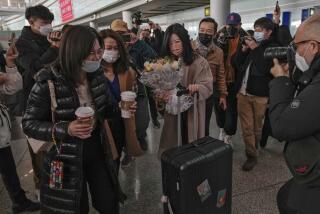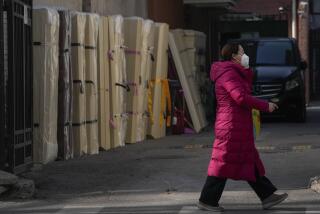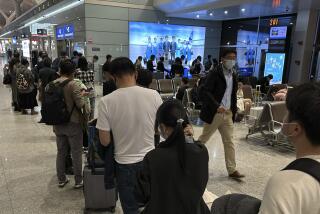Peking Unhappy With Reporting About Region : China Moves to Limit Foreign Access to Tibet
- Share via
PEKING — Chinese officials said Wednesday that they have decided to impose new limits on access to Tibet, the formerly independent Himalayan land occupied by the People’s Liberation Army 35 years ago.
Officials in Lhasa and in Peking told The Times that a government-sponsored celebration of Tibet’s experience as a region under Chinese sovereignty, scheduled to take place Sept. 1, will be closed to foreign reporters and observers from foreign governments.
In addition, a spokesman for the regional government in Lhasa said China in general will curb travel by foreign journalists to Tibet because of dissatisfaction with the news stories they write after their trips. “From the reports they did, we see they are not being very factual,” the regional official claimed.
Setback for China
The decision not to allow foreign witnesses at the Sept. 1 celebration is a setback for China’s efforts to demonstrate to the world the success of its policies in Tibet. For the last two years, workmen have been building new schools, hotels, sports facilities, roads, and other capital projects and decorating the Potala Palace in honor of the occasion.
A spokesman for the Chinese Foreign Ministry confirmed the new travel restrictions. He suggested that the new policy “may be temporary” and could be changed some time after the Sept. 1 celebration.
There was no indication of any effort to restrict travel by foreign tourists to Tibet, from which China earns greatly needed foreign currency.
The decision to close the September celebration to foreigners comes amid indications that local authorities fear some sort of violence or large-scale demonstration in support of Tibetan independence.
Meeting on ‘Public Order’
On June 24, Communist Party officials from the city of Lhasa met with Tibetan officials to discuss “public order” during the upcoming celebration. At the meeting, Doje Cedain, chairman of the regional people’s government, said, “All units must investigate those who may possibly create trouble for various reasons and must properly educate and guide them.
“It is necessary to strictly control guns, ammunition, explosives and toxic agents and to strengthen education for personnel carrying guns or pistols so that they can avoid losing them or having them stolen,” the regional news service quoted him as saying.
Although China has gradually been opening up more and more of the nation’s major cities to the outside world, it still carefully regulates travel by foreigners. Non-Chinese are currently allowed to visit approximately 260 cities and counties, but for the majority of these, a special permit is required.
China’s Communist regime first moved troops into Tibet in October, 1950. After a series of armed revolts by Tibetans against Chinese rule, the Dalai Lama, the former ruler of Tibet and the spiritual head of Tibetan Buddhism, fled to India in 1959.
Anniversary Celebration
The Sept. 1 celebration is aimed at commemorating the 20th anniversary of the founding of the “autonomous region” of Tibet under Chinese sovereignty in 1965. Authorities in Peking are planning to send a large delegation of officials to Tibet for the ceremonies.
On Wednesday, however, a spokesman for the foreign affairs office of the Tibetan autonomous region in southwest China turned down a request by two U.S. news organizations to cover the event. He disclosed that officials in Peking and Lhasa have decided not to invite any foreign guests or to accept requests by foreigners to attend the celebration.
The spokesman said the only reporters who will be permitted to visit Lhasa on Sept. 1 will be Chinese journalists and a few reporters from Hong Kong and Macao who, he said, will be under the control of the propaganda department of the Chinese Communist Party.
A Foreign Ministry official told The Times that one reason for the travel restriction was that “there is a difficulty to accommodate people.” The government-controlled New China News Agency reported last month, however, that a new hotel, the Grand Lhasa, will be finished in time for the September anniversary celebration.
Road to Nepal Opened
Earlier this year, China opened the road connecting Tibet and Nepal to foreigners. Since then, a number of foreign correspondents based in Peking have been granted permission to visit Tibet in order to make the trip from Lhasa to Katmandu, a journey China hopes will become a tourist attraction.
But Chinese officials have apparently been annoyed by news stories about the state of Tibet’s economy and about past efforts, particularly during the 1966-76 Cultural Revolution, to suppress Tibetan culture.
The provincial spokesman in Tibet complained about journalists’ use of a report on the provincial economy in the Shanghai World Economic Herald this year suggesting that Tibet is increasingly dependent on state subsidies.
More to Read
Sign up for Essential California
The most important California stories and recommendations in your inbox every morning.
You may occasionally receive promotional content from the Los Angeles Times.













